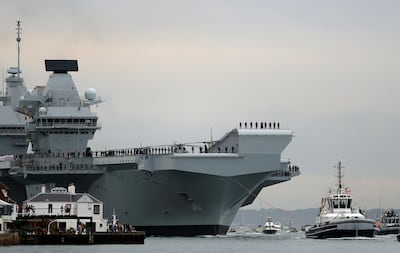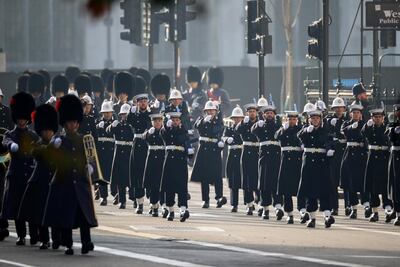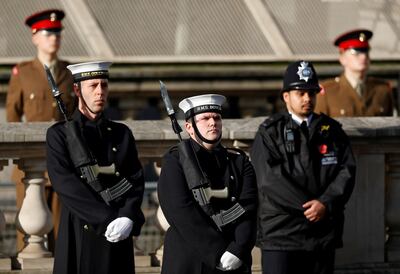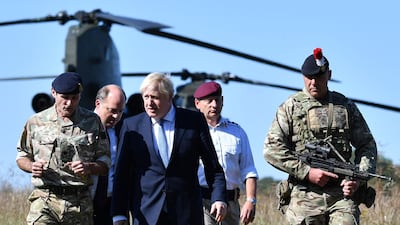In 1850, Lord Palmerston, the British foreign secretary and later prime minister, sent a squadron of gunboats to blockade the Greek port of Piraeus. A British subject, David Pacifico, had received what Palmerston believed was unfair treatment at the hands of the Greek government.
Palmerston justified sending gunboats by telling parliament: “A British subject, in whatever land he may be, shall feel confident that the watchful eye and the strong arm of England will protect him against injustice and wrong.”
This “gunboat diplomacy” extends back into British history, ever since the Royal Navy was celebrated in the famous 1740’s anthem Rule Britannia, with its famous chorus: “Britannia rules the waves.”
Since Palmerston in the 1850s – and despite the quite remarkable force projection of the Royal Navy to the South Atlantic during the Falklands War in 1982 – Britain’s military capacity has shrunk.
Palmerston's successor, Boris Johnson, promises a £16.5 billion increase in British defence spending to end what he calls "an era of retreat" from defence commitments. Mr Johnson emphasises naval spending to restore Britain's position as the foremost sea power in Europe.

At a time when so much taxpayers' money is being spent on the coronavirus pandemic, Mr Johnson also wants to create jobs in shipyards that just happen to be in areas where there has often been strong anti-government feeling – Scotland, Northern Ireland and the north of England.
He explained: "If there is one policy that strengthens the UK in every possible sense, it is building more ships for the Royal Navy. This will spur a renaissance of British ship building in Glasgow, Rosyth, Belfast, Appledore and Birkenhead. Guaranteeing jobs and illuminating the benefits of the union in the white light of the arc-welder's torch."
Shorn of the oratorical flourishes, the new money is claimed to be largest defence spending increase since the end of the Cold War.

American critics of the European arm of Nato will be happy. US President Donald Trump says Europe gets American defence on the cheap and Britain aims to continue as the second-biggest Nato military spender after the US. But Mr Johnson has a track record of eye-catching and expensive plans that are badly thought out and often go nowhere – literally.
As mayor of London, for example, he boasted that he would build what came to be known as the Garden Bridge. The project was eventually abandoned for a variety of reasons but not before £53 million, much of it public money, was spent on it.
So it is worth examining what the new spending is for. Beyond all the military kit, what is the perceived threat to British interests? What is the UK’s geostrategic role, if any?
For decades British tanks have taken part in military exercises on the North German Plain aimed at repelling an invasion from the Soviet Union.
In a world where anti-tank drones are cheap and deadly, spending nowadays on heavy armour is fighting yesterday’s wars. Cyber-warfare and a future conflict in space are, instead, high on the defence agenda. Sure, since Britain aims to emphasise its role as an international trading nation after Brexit, safe sea lanes are vital.
A British aircraft carrier may in future be stationed semi-permanently in or near the Gulf. But the idea of significant British force projection without major allies – the US and France – seems unlikely.
Some strategists also argue that Britain’s two new aircraft carriers are merely expensive floating targets.
The big change, beyond the rosy rhetoric of Mr Johnson and his colleagues, is that post-Brexit Britain’s global role is diminishing.
A year or so after the 2016 Brexit vote, Simon Fraser, the former permanent secretary at the UK Foreign Office, put it quite brutally: “It is hard to call to mind a major foreign policy matter on which we [in Britain] have had a decisive influence since the [Brexit] referendum.”

In the New York Times, veteran foreign correspondent Steven Erlanger offered his sense of regret that Britain had lost an empire and failed to find a post-Brexit role on the world stage.
He singled out Mr Johnson, then foreign secretary, for ludicrous posturing: “Many Britons see their country as a brave galleon, banners waving, cannons firing, trumpets blaring. That is how the country’s voluble foreign secretary, Boris Johnson, likes to describe it. But Britain is now but a modest-size ship on the global ocean. Having voted to leave the European Union, it is unmoored, heading to nowhere, while on deck, fire has broken out.”
Mr Johnson would describe Mr Fraser and Mr Erlanger as “doomsters and gloomsters" for talking Britain down. But they have a point.
In 1850, the threat of gunboats was enough to demand fair treatment for a British national abroad. But now, for example, the British national Nazanin Zaghari-Ratcliffe has been unfairly detained in Iran since April 2016. No British gunboats will protect her from what Palmerston called "injustice and wrong".
More investment in defence may be welcome but – to adapt the words of the late British humorist George Mikes – if Britannia no longer rules the waves, then Mr Johnson seems to think it is because the waves jolly well no longer deserve it any more.
Gavin Esler is a broadcaster and UK columnist for The National


